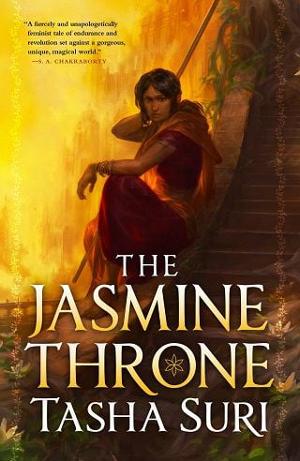Chapter 48: Rao
RAO
Santosh’s men had tried to drag their horses with them onto the seeker’s path, which bought Prem’s people time, just as Rao had suspected it would. It was just enough time to arrange an ambush.
“I grew up in the imperial court,” Rao said to the assembled men, as they stopped to catch their breath. “I learned the traditional methods, the grand strategies that date back to the Age of Flowers. If Santosh is as much of a purist as I remember, he’ll adhere to the rules of fair warfare. Without horses or chariots, he’ll struggle. He’ll use sabers. No archers or chakram throwers—certainly no whips,” Rao said, gesturing at the steel whip coiled at Prem’s waist. “He won’t sully his men with the weapons of other nations. He’ll be badly equipped to face an ambush.”
Prem wiped the sweat from his forehead. He was still in his heavy shawl, knotted tight to keep it out of the way.
“He’s a purist, true enough,” Prem said. “Fine. Let’s try it.”
“I can use a bow,” Lata offered.
“You’re going to keep well away from the battle,” Prem told her firmly. Lata inclined her head in agreement, but Rao made sure she had a throwing knife regardless.
The Saketans stood in the shadows, steel whips readied. The archers climbed into the trees. Rao joined them, one chakram drawn from his wrist held steady between his fingertips.
When Santosh’s men appeared, all but one of their horses were gone. Run off, most likely, utterly spooked by the forest. Poor beasts.
Prem held his men until Rao threw the first chakram. When he threw the second, they rained down their arrows. As soon the last arrow was loosed—the Parijati either huddling together in the center of the path to avoid the blows, or bleeding and prone on the soil—Prem and his men reared forward, their whips cutting through the air.
Rao leapt down from his branch, skirting around the melee to avoid catching the edge of the whip swords himself. That was when he saw Santosh, crawling away from the battle.
He drew a dagger from his belt. He leapt at the man and—missed, as Santosh rolled away from the blade and jumped to his feet with more agility than Rao had expected of him.
Rao swore, flipped the blade in his hand, and slid it back into place on his belt as Santosh drew his saber.
The saber was little good against a blade whip, but it was very effective in close range against traditional Aloran weapons, which were all intended for throwing or for prosaic close-range stabbing. Rao had four chakrams left on his arm—a handful of throwing daggers at his waist. He jumped back, flinging a blade at Santosh. It missed.
It would have been nice—pleasant even—if Santosh had been a bad fighter. But he’d grown up noble if not royal, and he knew how to handle a Parijati saber. His movements were perfect—sharp slices and stabs at precise angles, which Rao had to dart to avoid, wishing he had a blade whip of his own.
The Saketans suddenly moved as one, shifting, and Prem leapt out, flinging his whip in a rippling slice that caught Santosh on his saber-wielding arm. Slashed through to the skin. The man cursed in pain—but did not drop his blade.
“Two against one? Where is your honor,” Santosh roared.
“Be sure to tell Chandra what dishonorable dogs we are, if you win,” Prem said cheerfully, his steel whip slicing a sharp arc through the air that Santosh stumbled to escape.
Behind the flash of the whip, Rao saw a figure move in close behind Prem, saber drawn, breaking through the defense provided by Prem’s men. There was no time to think. On instinct, Rao drew a chakram from his wrist and flung the sharp-edged discus at the Parijati soldier.
It went through the man’s skull. But not before the man’s blade caught Prem at the arm.
Prem’s whip dropped. His shawl, torn ragged by the blade, fell from his shoulder.
And Rao—froze.
On Prem’s exposed throat, his bleeding arm, were—marks. Bruises.
No. Not bruises. Whorls of bark, large as Rao’s palm. Veins, spidering from them, limned in green. The blood that poured from his wound was not quite red. Not quite human.
Santosh took advantage of Rao’s shock, of Prem’s stagger as he tried, despite his wound, to draw his shawl back into place. He lunged for the low prince.
Prem’s eyes widened. He fumbled for his whip. Rao, horrified, scrambled for one of his chakrams, his knives, anything—
Prem’s whip flashed through the air, cutting through Santosh’s armor, bloodying his arms and blowing open his lip. But Santosh had already thrust forward. His saber had slid, cleanly, straight through Prem’s stomach.
Rao’s mind went white for a moment. He saw an arrow fly past him. Heard shouts, muted, as if his ears were beneath water and the water were the thud of his own bloody rage pouring through his skull. The next thing he knew, he had Santosh pinned beneath him. Santosh was yelling for his men, for Chandra, for help, for anyone to help.
In a haze, Rao drove one of his steel chakrams by hand into Santosh’s palm. He drove it hard and vicious, feeling the bones snap under it like the necks of small furred creatures.
“He is a royal of Saketa,” Rao said raggedly. “You had no right, no right. All your talk of honor—you had no right.”
“The emperor,” Santosh gasped out. His teeth were washed red. “For the emperor, for Parijat, my men, protect me!”
But one of Prem’s men was now at Rao’s back. Another was leaning over Prem, talking to him urgently. And there was Lata, trying to staunch the flow of blood, tears streaming down her face. The battle had to be over, and Rao knew, knew distantly that he should take Santosh hostage, that Aditya could use him as leverage.
“Chandra is not our emperor,” Rao said, voice rough.
Santosh’s mouth was open, still yelling, so Rao lifted his bloodied hand and took one of his daggers from his belt. Without pausing, he drove it to the back of Santosh’s throat.
They set up camp. Prem’s men didn’t leave. It was a miracle that they remained, but Rao accepted it. He had thought the rot on Prem’s skin would send them running. But they merely shook their heads. “We knew what he had, my lord,” one said. “He was our lord. He told us. He explained. It doesn’t spread. Not between people.”
Together, he and the men set up a tent for Prem to be settled in. He kneeled on the ground, once it was arranged, and watched Lata work, preparing her tinctures. Preparing the bandages, her eyes red. She’d known. All this time. Only Rao, it seemed, had been in the dark.
He couldn’t ask Prem now why he hadn’t told him. He could only feel the blood drying on his clothes, and watch the saber-wounded mess of Prem’s stomach rise and fall. He could not see how Prem could survive this.
“It can’t infect you,” said Lata. Her voice was careful, calm. “He wasn’t lying about that. Where is his pipe?”
“His pipe?”
“An analgesic,” she said. “It dulls the pain. He’s found it helpful these past months.”
“Won’t do any good,” said Prem. He sounded hoarse. “It hasn’t worked for a while. And now…” He touched a hand to his upper abdomen. Swore.
“Don’t touch it,” snapped Lata.
“What difference will it make now?”
She said nothing. Prem closed his eyes, his skin pale and drawn.
“You should never have come to Ahiranya,” Rao said, a knot of helpless sickness in his stomach. He wanted to scream at his friend, to shake him. “You should have remained in Saketa, drinking wine.”
“That was never my way,” said Prem, with difficulty. Already, the bandages Lata had applied to his stomach were wet with blood. “Don’t get me wrong, Rao. I like a good wine. But seeing the right man on the throne…”
“Ahiranya has done this to you. Trying to see Aditya crowned has done this to you.”
“Ahiranya didn’t do this to me,” Prem said hoarsely. “I was sick before I came here.”
Rao shook his head. “What do you mean? How can that be?”
“This rot,” Prem said. “I don’t know how it’s spread, but it exists in Saketa too. Hundreds have died of it. The high prince has managed to keep the whole business quiet for now, but…” Prem coughed. A wet sound, bubbling with blood. Lata moved quickly, daubing the blood from his lips. “The last two years. It’s dug its roots in. It’s becoming hard to ignore. It must be everywhere.”
“It hasn’t reached Alor,” Rao said.
But did he know that for certain? He had been to Alor only rarely, after his fostering to Parijat. His elder brothers supported his father ably, but there were aspects of governing the city-state of their birth that they had never involved him in. If a strange blight had attacked Alor’s fields and farms, its herds of cattle, would any of them have told him?
“Rao. Chandra. He. He’s made the mothers angry. Using their names for political ends. Great, good women of old, they didn’t die for the likes of him. Now they’re punishing us all.”
“You can’t believe that’s why you’re—like this.”
“Why else would the rot get so much worse?” Prem asked. “I know the will of the mothers. I feel it.” He grimaced again. With a shuddering breath, he said, “What does your nameless god say? Does he disagree?”
“No theological arguments,” Rao said. “Not now.”
“I don’t know,” said Prem. “Now feels likes the perfect time.” He tried to reach out, but groaned in pain. So Rao reached for him, taking his hand.
“We need him gone, Rao,” Prem murmured. “And mothers help me, I respect your faith, strange as it is. But Prince Aditya needs to put the priesthood aside and become the emperor Parijatdvipa needs.”
Rao swallowed. Nodded. Beneath his grip, he could feel the bark on Prem’s skin, fibrous and rough.
“I didn’t stay because I hoped to save her,” Prem said. “I stayed because I knew he wouldn’t listen to any of us but you. You share his faith. You’re his dearest friend. If you tell him to return, to take his crown, to make a sacrifice of his calling…” Another cough. Then: “I had to bring you to him. I’m sorry I won’t—finish it.”
“No,” Rao said. “No.”
In the dark of a tent, on a path through a forest, so far from home that Saketa and Alor both felt like distant dreams—this was not how Prem should die.
“Tell me one thing,” said Prem. Voice wet. “Consider it a boon.”
“Anything.”
“Who are you really?” Prem asked. “What prophecy were you named with by your nameless god? What do you know of what’s coming?”
“Some prophecies are small,” Rao said.
“But yours isn’t,” said Prem.
A name should not be said until the time is right. A name should only be spoken when the fulfillment of a prophecy is at hand. And yet.
It was not like telling his name at all. A secret told to the dead is a secret still untold. And from the look in Prem’s eyes—from the profile of Lata’s turned-away face, the hunch of her shoulders—Prem did not have long.
Rao leaned forward. He whispered against Prem’s ear. Syllable after syllable.
For a moment, Prem was silent. Then he let out a choked laugh.
“No wonder you stayed for her,” said Prem. “No wonder.”
Lata was waiting outside the tent. It was light. “I can perform his last rites,” she said. Her voice was thick.
Rao swallowed. He felt as if his throat were full of glass.
“In Saketa, they don’t allow women to perform funeral rites.”
“There’s no one else.” Her voice was gentle, her expression remote.
“They don’t allow it in Srugna. Or Dwarali. Or Parijat. They don’t…”
“There’s no one else,” she repeated.
He nodded. He felt impossibly tired.
“Thank you,” he said. “For taking care of him.”
“What is the point of knowledge that isn’t used?”
The men had all waited. They listened, as Rao told them Prem was dead.
“He wouldn’t want us to return to Saketa,” one of Prem’s favorite pachisa players murmured. “We’re going to Emperor Aditya. It’s what he would have wanted.”
They buried him. There was no choice, here in the woods.
They had to keep walking. They had no choice about that either. Malini had not come, and Prem was dead.
“Tell me what it’s like in the lacquer gardens,” Rao managed to say to Lata as they trudged along.
Take me away from here, he wanted to say. Spin me a tale that allows me to leave the pain and the loss and the rot of this place for a time. Please give me that comfort.
Lata’s feet crunched down the long grass. She ran a stick along the ground ahead of them, warning any sleeping snakes that humans were passing, and it would be best to slither away and leave them be.
“I know less of the gardens than you do,” she said.
“Anything you’ve read. I know you have. Please.”
“It was a place built for the sake of a vision,” she said finally. “And like all things vision born, it is an irrational artifice.”
“You sound like you’re quoting.”
“Very perceptive. I am. The texts of my own teacher.”
“What does it mean—irrational artifice?”
She raised her head, squinting against the sun.
“You’ll see for yourself, soon enough,” she said. “Look.”
Ahead of them stood a gorge, and across it lay a bridge of root, carved between walls of mountain rock. Through the path, he could see a temple garden. A great monastery.
They had reached Srugna. They’d found the lacquer gardens, where Aditya awaited. There were men, watching for them at the top of the path. Not soldiers of Parijatdvipa, in imperial white and gold. Dwarali horsemen. Saketan liegemen. Even Aloran warriors. His father’s men, sent to ensure that Aditya would take the throne.
Rao looked at them all and thought of the words he would have to say.
The low prince of Saketa is dead. Prince Prem is dead. But I am here, Aditya. I’m here.
 Fullepub
Fullepub 



